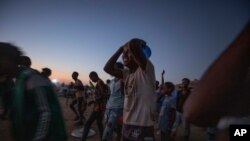Ethiopian Prime Minister Abiy Ahmed called an extraordinary session of the parliament on Monday, while the conflict in the country’s northern Tigray region continues.
Late Sunday, Reuters reported that the leader of the Tigray People's Liberation Front (TPLF) Debretsion Gebremichael claimed in a text message to the new agency that Tigray forces had shot down an Ethiopian plane and had taken a town form the federal forces.
There has not been any immediate comment to such claims from the government or the military.
In a related development, the U.S. Embassy in Eritrea said that six explosions were heard overnight in the capital, Asmara.
The explosions came hours after Abiy declared victory in the offensive of the government forces against TPLF and the army said it had taken “full control” of the Tigray capital Mekelle.
However, government sources said TPLF leaders remained on the run.
Abiy said Saturday that Mekelle had been “captured,” after giving forces of TPLF a 72-hour ultimatum to surrender to the national government. Abiy announced a military offensive against the regional government in Tigray on November 4, saying it was in response to an attack by Tigray forces on a federal military base.
Authorities have not confirmed whether there were any deaths in an offensive Saturday, but the International Committee of the Red Cross noted that the Ayder Referral Hospital in Mekelle was lacking body bags for the deceased.
Meanwhile, local hospitals in Mekelle were running out of medical supplies to treat the injured, aid workers said Sunday.
According to the ICRC, roughly 80% of patients at the hospital were suffering from trauma injuries.
"The hospital is running dangerously low on sutures, antibiotics, anticoagulants, painkillers and even gloves," Maria Soledad, the head of operations for the ICRC in Ethiopia, was quoted as saying in a Sunday press release from the ICRC.
"The influx of injured comes more than three weeks after supply chains were disrupted into Mekelle,” she added.
Telecommunication and internet services in the Tigray region have been cut for weeks, making it nearly impossible for journalists and aid workers to confirm reports of violence.
Tens of thousands have fled the area for neighboring Sudan. Some reports say thousands have been killed since violence broke out earlier this month.






